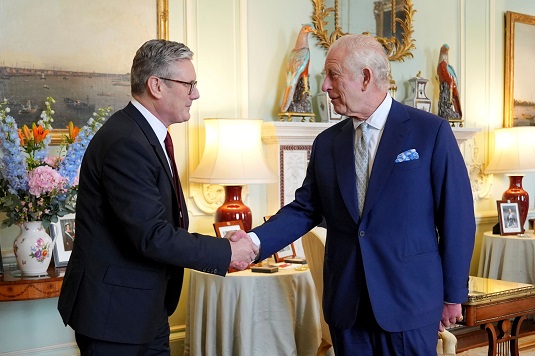
The king shared how he had been greatly encouraged by the many examples of community spirit that had countered the aggression and criminality from a few with the compassion and resilience of the many ...Could this be read as an expression of solidarity with anti-fascist forces that turned out, especially on Wednesday when the planned far right attacks on asylum and immigration services didn't happen but a huge counter-mobilisation effort did? It's difficult to read it any other way. Which raises an interesting question. Labour would benefit from directly associating itself with "the street" because the overwhelming majority of the public were against the riots, and yet Starmer has ceded this territory to the King.
There are two things going on here. Starmer personally, and Labour politically are favourably disposed towards the monarchy. His Tonyness can claim the credit for saving the institution and helping it modernise its media operation. These days with popular support in decline, it falls to Labour to shore it up. After all, if Starmer's project is the modernisation of the state and the restoration of its authority, that includes the monarchy. Having the King flatter popular anti-fascism places the state rhetorically on the side of multiculturalism, keeping it in line with public opinion and the growing popular consciousness. It's also consistent with Labour's handling of the riots. Politically, the furthest Starmer has gone is call the fascist rioters "far right", but has treated it as a technical law and order issue. I.e. His is an "above politics" affair. Having the King endorse anti-fascism is an attempt to elevate it and multiculturalism as a matter beyond party politics. I.e. racism is depoliticised as a matter of individual behaviour and personal morality. No need to ask further questions.
And yet a perfect circle is an impossibility in bourgeois politics. While there is an opportunity to consolidate Labour's meagre base, especially now the Greens and the extra-Labour left have started making inroads, it's evident that Starmer and the Labour leadership would rather retain the "flexibility" to position themselves to the right when required. So no criticisms of right wingers for what they've done stoking the riots. That is apart from the beyond-the-pale Tommy Robinson. Certainly no action to curb the right wing press is forthcoming, nor any cross words about the disgusting positioning of some Tory leadership contenders. Labour is fully signed up to the "genuine concerns" consensus and has no interest in tackling the background to the riots, because scapegoating might suit its interests too. Which are, when right wing Labour is in charge, forever chasing right wing votes while its left flank is dropping to bits.
Image Credit
4 comments:
The number of current and just retired Labour MPs who now sport the "Sir" and "Dame" handles is truly sickening. In all honesty, how can we be expected to take them seriously?
All I can say is: "Ruritania is not a real country."
It is further grist to the mill of New -New Labour's irrelevance with respect to the basic idea of social progress.
Phil- I have read this blog and the book and so on. I even read your recently published guardian article.
Your analysis regarding the authoritarianism and state support that new new labour are going for is compelling. Kiss-arsing the monarch is expected.
I fear that the right will do what they have done in the rest of Europe and marry their racism to an economically progressive agenda. I think that would, in a world where you only need 37% of the vote, win. Are you concerned about that?
Whether it's ultimately attributable to Starmer or Charlie, it's quite a good move, since the monarchy seems to be coming under increased attack lately from some of the capital forces which are - if not exactly the same, at least not far removed from - the ones that are fanning right-wing divisive politics.
The army obeys the monarch, and the monarch can't be bought, and capital doesn't like that, because it means that someone other than its owners is ultimately in charge. Under Charlie the institution is now perceived as vulnerable in a way that it wasn't under Lizzie, due to his much lower personal popularity.
This analysis, esp the final paragraph, seems spot-on to me. Thanks.
Post a Comment